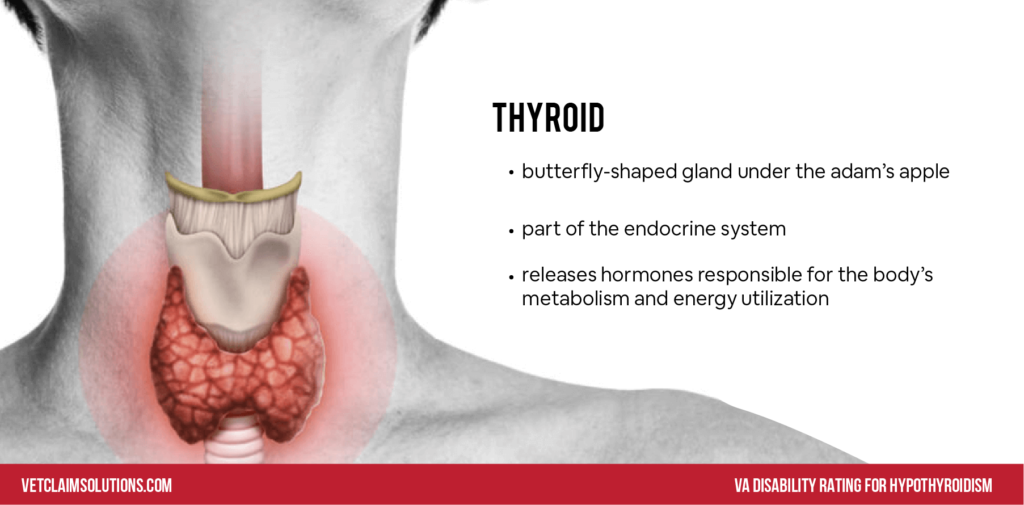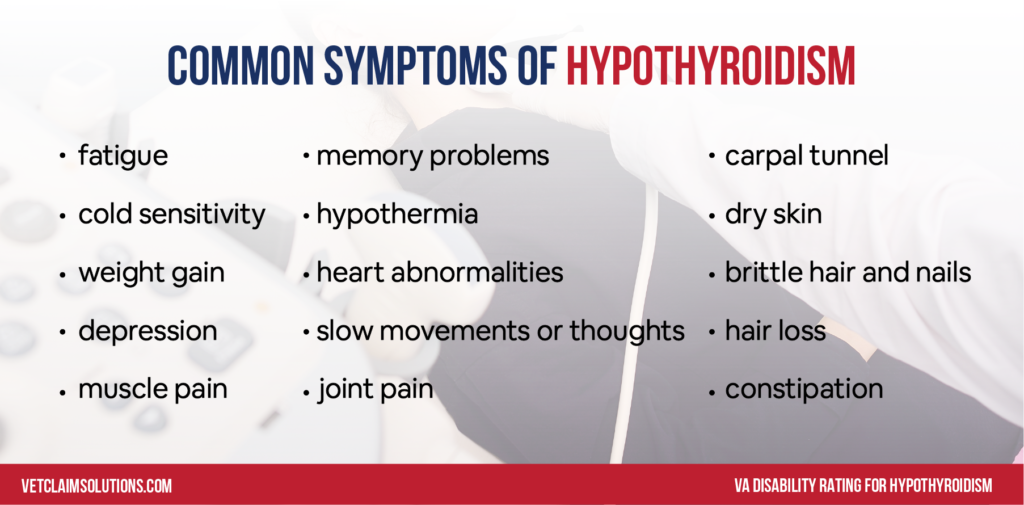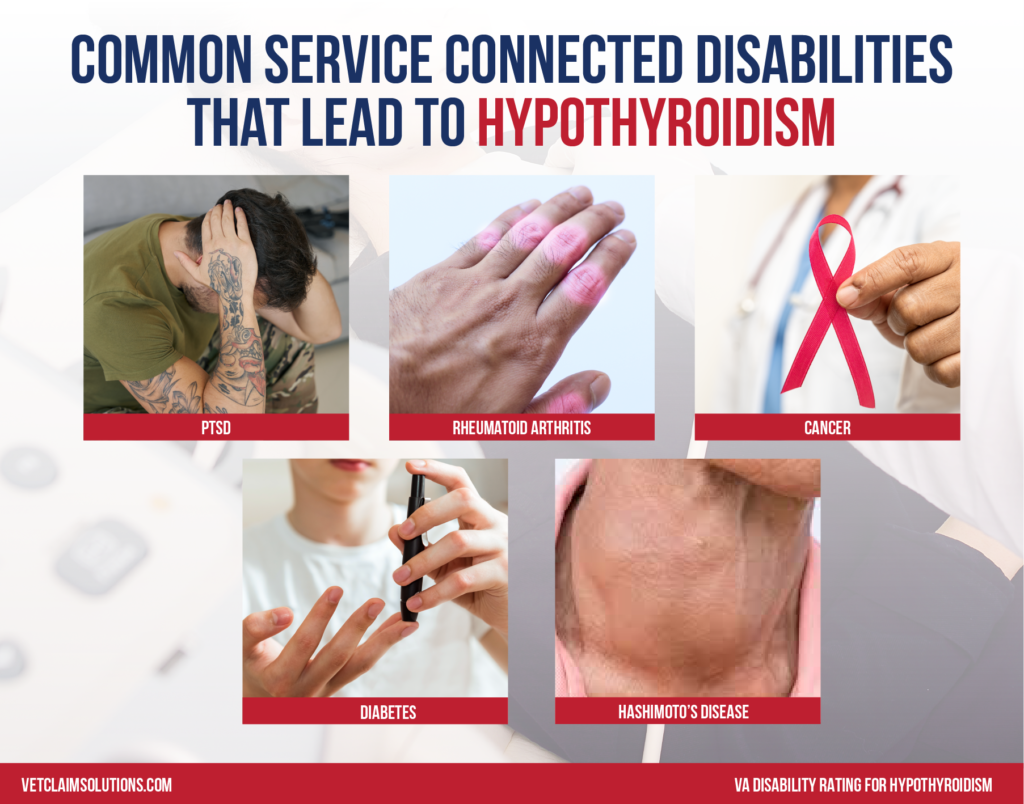If you or a loved one has been diagnosed with hypothyroidism, there is help available to you. The U.S. Department of Veterans Affairs (VA) offers disability ratings for veterans and their families affected by hypothyroidism. This blog post will provide information on the VA disability rating process and how it can benefit those with hypothyroidism. We will discuss how VA rates hypothyroidism, what conditions qualify for benefits, and how to apply. So if you or someone you know is suffering from hypothyroidism, read on to find out how the VA disability rating can help.
What is the Thyroid

The thyroid is a small, butterfly-shaped gland located under Adam’s Apple. It is part of the endocrine system and releases hormones that are responsible for the body’s metabolism and energy utilization. These hormones also regulate a variety of bodily functions, such as breathing, heart rate, body weight, temperature, muscle strength, and even menstrual cycles. An imbalance of thyroid hormones can lead to a variety of conditions, including hypothyroidism.
What is Hypothyroidism
Hypothyroidism, also known as “underactive thyroid,” is a medical condition in which the thyroid gland does not produce sufficient thyroid hormone. The thyroid gland is located at the front of the neck and produces the hormone thyroxine, which helps regulate body functions such as heart rate, breathing, body temperature, muscle strength, and metabolism. When the gland does not produce enough of this hormone, it can result in various health concerns, including an altered heart rate, body temperature, and metabolism. Hypothyroidism is more commonly seen in women over 60 and can affect anyone regardless of age or gender.
Signs and Symptoms of Hypothyroidism
The most common symptoms of hypothyroidism include fatigue, cold sensitivity, weight gain, depression, and memory problems. Other lesser-known but still important signs and symptoms of hypothyroidism include hypothermia, heart abnormalities, slow movements or thoughts, muscle pains, joint pain, and carpal tunnel. Many individuals may also experience dry skin, brittle hair and nails, hair loss, and constipation as a result of hypothyroidism.

Causes of Hypothyroidism
Hypothyroidism is usually caused by an autoimmune disorder, such as Hashimoto’s disease. This occurs when the body mistakenly targets and attacks the thyroid gland, causing it to become unable to produce enough hormones. In some cases, hypothyroidism can also be caused by medications, radiation treatment, or surgery that affects the thyroid gland. Exposure to environmental toxins, such as burn pits and other contaminants, can also be a factor in the development of hypothyroidism. In rare cases, it can be caused by an iodine deficiency or a congenital defect in the thyroid.
The VA Rating Levels for Hypothyroidism
The VA rates veterans with hypothyroidism at either a 30% or 100% disability rating. Diagnostic code 7903 is the specific criteria used to classify the type and severity of a veteran’s disability and determine how much compensation they will receive.

If you have hypothyroidism but don’t experience myxedema, you may qualify for a 30% VA rating. The criteria include any of the following: mild signs and symptoms such as fatigue and cold intolerance, lab results indicating an imbalance in hormones, or other signs that suggest thyrotoxicosis. If a veteran is diagnosed with hypothyroidism and has no signs of myxedema, then they can qualify for the 30% rating.

If you experience a myxedema crisis and mental disturbance due to hypothyroidism, you may qualify for a 100% VA disability rating. Myxedema is an extreme form of hypothyroidism that can be life-threatening if not treated in time.
Symptoms include cold intolerance, severe muscle weakness, and abnormal heart function, such as pericardial effusion, low blood pressure, and bradycardia. In addition to the physical symptoms of myxedema, it can also cause mental disturbances, including confusion, emotional lability, psychosis, and delirium. If a veteran has been diagnosed with both hypothyroidism and myxedema crisis accompanied by mental disturbance, they may qualify for a 100% VA disability rating. Thyroid cancer also qualifies for a 100% rating.
Time Period of VA Rating for Hypothyroidism
The Veterans Administration (VA) has specific time limits on their rating for hypothyroidism. While other VA ratings may be permanent, a temporary 100% rating for hypothyroidism is granted only until your myxedema has been in remission for six months, referred to by the VA as “crisis stabilization”. After this time period, each symptom of your hypothyroidism will be rated separately under the relevant body systems based on their residuals. For example, even if hypothyroidism is no longer causing myxedema, the visual impairment symptoms may still be evaluated and awarded a rating.
In the case of a 30% rating, this evaluation will only remain in place for six months after the initial diagnosis. Once that period is completed, each symptom will be rated under separate body systems just as if you had been granted with a 100% rating and stabilized for six months. This provides veterans the opportunity to have their condition reevaluated , and potentially receive a higher rating based on their current symptoms.
Service Connection for Hypothyroidism

Direct Service Connection
When seeking compensation for hypothyroidism through the VA, a veteran has to prove that it is related to something that happened during their military service. Proving a direct connection can be difficult, especially if the veteran did not have any awareness of the condition during their service time.
One example of a direct service connection is exposure to contaminants from burn pits. The VA evaluates these cases on an individual basis and must first determine if the veteran’s hypothyroidism is related to burn pit exposure.

Presumptive Due to Agent Orange Exposure
The VA has established presumptive conditions related to exposure to Agent Orange. If a veteran served in Vietnam, Laos, Cambodia, Guam, American Samoa, Johnston Atoll, or the Korean DMZ during the prescribed periods and has been diagnosed with hypothyroidism, they don’t need to prove that their condition is related to service. Instead, they just need to show that they were in an area covered under the VA’s Agent Orange presumptive exposure law. If a veteran is able to prove this, they will qualify for presumptive service connection, which grants them access to health care and disability compensation through the VA.
The VA takes these claims very seriously and makes sure that veterans who are exposed to Agent Orange receive the proper benefits and care they deserve. Veterans can contact their local VA office or go online to learn more about filing a claim for presumptive service connection due to Agent Orange exposure. It is important for veterans to understand their rights and know how to file a claim properly in order to receive the best possible outcome.
Secondary Condition
If you don’t qualify for a presumptive service connection, you may still be able to get VA disability benefits for hypothyroidism through a secondary service connection. With this form of connection, the VA recognizes that certain conditions can lead to other conditions as a result of medical treatment or general health issues. For example, if medications taken due to a service-connected PTSD disorder result in hypothyroidism, the VA may grant service connection for this condition.
Common service-connected disabilities that lead to hypothyroidism include PTSD, diabetes, rheumatoid arthritis, cancer, and Hashimoto’s disease. To be granted a secondary service connection for hypothyroidism, it is necessary to prove one has a service-connected disability, as well as having a diagnosis of hypothyroidism that is not already service-connected. A doctor must also medically link the two conditions together with a nexus.

Other conditions can also lead to hypothyroidism, making it important for individuals to talk to their doctor and gather medical evidence linking the service-connected condition to their hypothyroidism. Amassing such evidence should increase the chances of being granted a secondary service connection for hypothyroidism.
Need Help with Filing a Hypothyroidism Claim?
If you are a veteran who is struggling with filing a claim for hypothyroidism, Vet Claim Solutions can help. Our team of experienced claims coaches have years of experience helping veterans successfully file their disability claims for conditions like hypothyroidism. We are here to help you navigate the claims process and ensure that you receive the maximum benefits you deserve. Contact us today for more information or to get started on your claim. We are here for you!
FAQs:
1. What is an overactive thyroid?
An overactive thyroid, also known as hyperthyroidism, is a condition where the thyroid gland produces too much of the hormone thyroxine. This can cause symptoms such as fatigue, weight loss, and an increased heart rate.
2. What is an enlarged thyroid gland?
An enlarged thyroid gland, also known as goiter, is a common condition where the thyroid gland becomes enlarged due to either an increase in the production of hormones or the growth of the tissue in the thyroid.
3. What is an initial diagnosis of a thyroid disorder?
An initial diagnosis of a thyroid disorder is typically done through a blood test to measure the number of thyroid hormones in the bloodstream. Additionally, depending on the individual’s symptoms, a physical exam and imaging tests may also be utilized to diagnose thyroid disorders.
4. What is toxic thyroid enlargement?
Toxic thyroid enlargement, also known as Graves’ disease, is an autoimmune disorder where the body’s immune system mistakenly attacks the thyroid gland, causing it to produce too much of the hormone thyroxine. Symptoms may include fatigue, weight loss, and an increased heart rate.
5. Is hypothyroidism VA presumptive?
Yes, the VA considers hypothyroidism to be presumptive for veterans who can prove exposure to Agent Orange. In order to qualify for these benefits, however, you must have served in one of the areas covered under the VA’s Agent Orange presumptive exposure law.
6. What is a normal thyroid function?
A normal thyroid function is when the body produces enough of the hormone thyroxine to regulate metabolism but not too much. The thyroid gland is responsible for producing this hormone, so it is important to monitor any changes in the thyroid levels.


